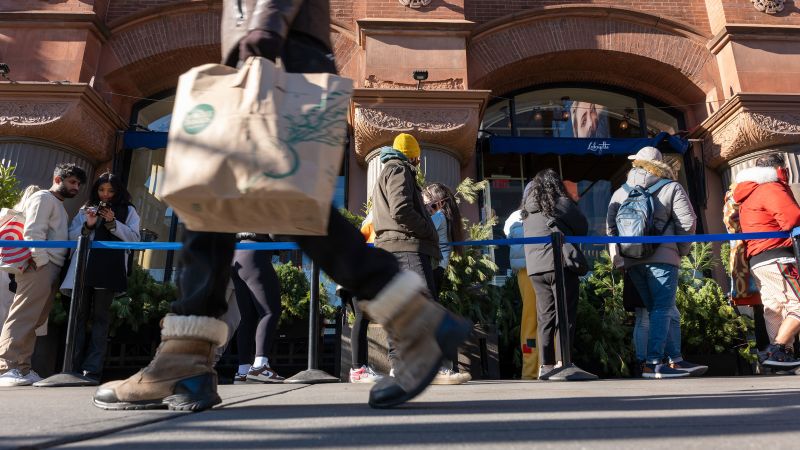A version of this story first appeared in CNN Business’ Before the Bell newsletter. Not a subscriber? You can sign up right here. You can listen to an audio version of the newsletter by clicking the same link.
Investors are betting on a soft landing — a successful effort by the Federal Reserve to pare back inflation without sparking a recession — based on strong economic data and hopes that interest rate cuts are imminent.
But Wall Street could be getting ahead of itself: History proves that investors would be well-advised to remain cautious this year.
The good news: Recession fears were widespread at this point last year, but economic growth in the US has proven resilient.
Inflation is easing and is closer to the Federal Reserve’s 2% target than it has been since the beginning of 2021. Policymakers are forecasting that interest rates are restrictive enough to begin cutting them this year.
The Fed has hiked rates 11 times in the past two years, but the unemployment rate has consistently remained below 4%.
Excess pandemic-era savings, meanwhile, have lasted longer than many economists predicted they would. That means consumers are still spending money and are feeling confident about the future. Their optimistic outlook helped trigger a huge market rally in the second half of last year, lifting the S&P 500 by 24% in 2023.
Economists are eager to say the US has brought inflation rates down while avoiding recession and to declare an official soft landing.
US Treasury Secretary Janet Yellen said last Friday after another month of strong employment numbers that “what we’re seeing now I think we can describe as a soft landing.”
That’s a shift from Yellen’s previous statements where she hedged her economic assessment, stating that a soft landing was only “possible.”
Historically, there’s a long lag before elevated interest rates take their toll on the economy, said Jim Reid, Deutsche Bank’s head of global economics, in a note this week. Six out of the past 13 cycles saw the economic impact become most visible between 19 and 28 months after the first Fed hike, he found. That means a recession before the end of 2023 would have been quite early.
Based on empirical evidence alone, said Reid, the risk of recession is higher today than it was in 2022 or 2023.
The bad news: Soft-landing talk is not unusual ahead of recessions, said Reid. His team found that mentions of a soft landing in Bloomberg articles spiked significantly ahead of the 2001 and 2008 recessions.
Sure, past performance does not guarantee future results, but there are other omens.
The spread between the yields of the 2-year and 10-year US Treasury notes have been inverted since July 2022. When long-term bond yields fall below short-term bond yields it means that investors are more nervous about the immediate future than the longer term. These types of inversions have preceded each of the last 10 recessions in the US.
And while the US consumer remains resilient, Deutsche Bank data shows that credit card delinquencies are at their highest rates in more than 12 years.
Geopolitics, meanwhile, are tense. Russia’s war on Ukraine, the conflict in the Middle East and attacks on shipping in the Red Sea have led to what JPMorgan CEO Jamie Dimon calls “maybe the most dangerous time the world has seen in decades.”
Another political fight to avoid a US government shutdown is also possible this year, and the country is still running a historically large budget deficit.
Let’s not forget that it’s also a presidential election year in the US.
And yes, the S&P 500 rallied last year, but that’s largely due to the power of the Magnificent Seven — the tech giants including Apple, Amazon, Alphabet, Meta, Microsoft, Nvidia and Tesla, that make up the majority of the index and that collectively soared well over 100% in 2023.
In short: There’s a lot going on, and any outcome is possible.
“The data in front of us heavily points to a soft landing. At this stage of the cycle it typically tends to do so,” wrote Reid and his team. “A big decision to make for 2024 is whether to follow the data or follow history.”
This week could bring big changes for the world’s largest cryptocurrency.
Within the next few days, the United States Securities and Exchange Commission is expected to approve the first-ever spot bitcoin exchange-traded fund in the United States (existing bitcoin ETFs hold related assets or bitcoin futures contracts rather than the cryptocurrency itself). It is currently considering applications for 13 bitcoin ETFs from mega-firms like BlackRock and Fidelity.
ETFs have soared in popularity in recent years, and crypto-advocates are hoping that an okay by this SEC, known for being tough on digital currencies, could legitimize bitcoin in the eyes of the everyday American investor.
Bitcoin prices have climbed in anticipation. The value of the currency has jumped about 60% in just three months.
Yes, but: Gary Gensler, SEC chairman, issued a warning to retail investors on Monday as they gear up to announce their decision.
“Investments in crypto assets also can be exceptionally risky & are often volatile. A number of major platforms & crypto assets have become insolvent and/or lost value. Investments in crypto assets continue to be subject to significant risk,” Gensler wrote on X.
A decision is expected to be made by January 10.
A potential antitrust lawsuit against Apple by the federal government could be a turning point for the company, reports my colleague Brian Fung.
Speculation about a landmark case is again on the rise after The New York Times reported Friday that the Justice Department is in the final stages of a years-long investigation into Apple, which could lead to a lawsuit later this year.
The probe reportedly focuses on everything from the seamless integration between the iPhone and Apple Watch to the company’s digital payments system and Apple’s use of green text bubbles to differentiate Android text messages from iMessage communications — in short, a broad look at Apple’s tightly controlled, walled-garden ecosystem that’s turned it into $2.8 trillion behemoth.
Apple — the most valuable company in the world — is the only leading tech giant the US government has yet to sue on antitrust grounds within the past few years. If antitrust officials do go after Apple, expect it to be a “full-frontal assault” on Apple’s business, said Adam Wolfson, an antitrust attorney at the law firm Quinn Emanuel.
“Depending on what the Department of Justice actually alleges, it could potentially attack all the ways, or many of the ways, that Apple runs its business and maintains itself as one of the most profitable companies in the world,” Wolfson said.
Read the full article here




